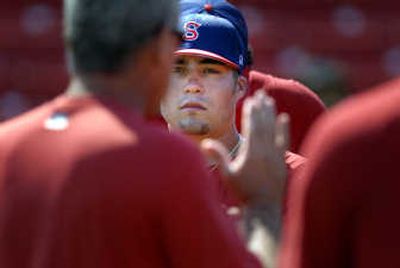Maxwell has a head for the game

Growing up in Anchorage, Alaska, Anton Maxwell never had a favorite baseball team.
He does now.
The Texas Rangers became Maxwell’s team when they drafted him out of Oregon State in the 31st round (950th overall) of this year’s Major League Baseball draft.
Maxwell is two weeks into his career with the Spokane Indians – the Rangers’ short-season Class A minor league affiliate. Even though he’s still several steps removed from the big leagues, as far as Maxwell is concerned, playing with the Indians is already a dream come true.
Because every time he runs onto the field, he gets to wear The Hat.
“I always wanted one of these baseball hats. I always just wanted to be able to play wearing the hat with the guy in the back,” Maxwell said, referring to the logo of a baseball player swinging a bat that is featured on the hat band of all minor league caps.
So far, the stocky reliever has a 9.00 ERA and has allowed five hits in the three games he’s pitched wearing The Hat.
Those numbers don’t look all that impressive on paper, but Maxwell is also 1-0 in the win-loss column, with seven strikeouts to his credit.
Indians manager Tim Hulett attributes some of Maxwell’s problems to the fact that he’s still trying to get accustomed to his new environment.
“Unless he’s Nolan Ryan, he’s gonna have some growing pains,” Hulett said, “And I’m sure Nolan had a few of those in his day.”
But Maxwell brings something special to the team: As a member of Oregon State’s back-to-back College World Series championship teams, Maxwell has played at the highest level of collegiate baseball, and he knows how to win ballgames.
“He’s been on a championship-winning team. Twice,” Hulett said. “And there’s something to that. Guys who play on championship teams bring something to the table that other guys who haven’t done that can’t bring.
“I guess you could call it a winning mentality.”
Maxwell transferred to Oregon State from Feather River Community College (Quincy, Calif.) at the end of his freshman year and had a tremendous sophomore season in 2005 when he went 11-1 as a starter for the Beavers – who returned to the CWS for the first time since 1952, but bowed out quickly after a 0-2 start.
His junior year came with a series of off-field problems that resulted in on-field setbacks for Maxwell.
“That year my parents were going through the possibility of divorce, and I also had to deal with the death of a family friend. That kinda hurt,” Maxwell said. “I had a bad junior season because all this stuff was happening at home.
“And I was stuck in Oregon, but my head was back home because that was where I really wanted to be.”
Dealing with his personal issues contributed to two team violations that resulted in two suspensions from the team, and also in Maxwell’s omission from the squad that won the Beavers’ first championship title in Omaha, Neb.
Things got so bad that after his second suspension, Maxwell looked into the idea of transferring.
“I had gotten into trouble a couple of times at that point, and I kinda looked into other schools, just in case,” Maxwell said. “But (the Beavers) shut down that idea and said, ‘No, you’re not leaving.’ They wanted me back.
“And I was happy, because I wanted to stay. I liked the team and we were all really close.”
That became a pivotal point in Maxwell’s career.
“I got in trouble and I did my time, I did community service and made up for it,” said Maxwell, who declined to elaborate on the nature of his transgressions. “All my problems were just coming together at the time and trickling back down to me and messing up my life. And I realized that I needed to change everything.”
One of the on-field changes that Maxwell made during his senior year comeback was to switch from being a starter to being a reliever.
“I told (Beavers pitching coach) Dan Spencer I liked being a reliever better,” Maxwell said. “Because while I had some success as a starter, I just had this feeling I was never going to be able to accomplish what I wanted as a professional. I didn’t think I would ever be a professional starter, and I had more success as a reliever.”
As a reliever, Maxwell finished his senior year with a 2.36 ERA that surpassed the 4.33 from his 11-1 sophomore season. He also finally got to return to the CWS, and this time he was a part of the celebrations when the Beavers won their second consecutive title.
Maxwell is a regular in the Indians’ pitching rotation. Stats aside, Hulett likes what he’s seen from the former Beaver.
“He throws strikes,” Hulett said. “And a lefty that can come in and throw strikes – and move the ball around in the strike zone like he can – can survive in this game for a long, long time.”